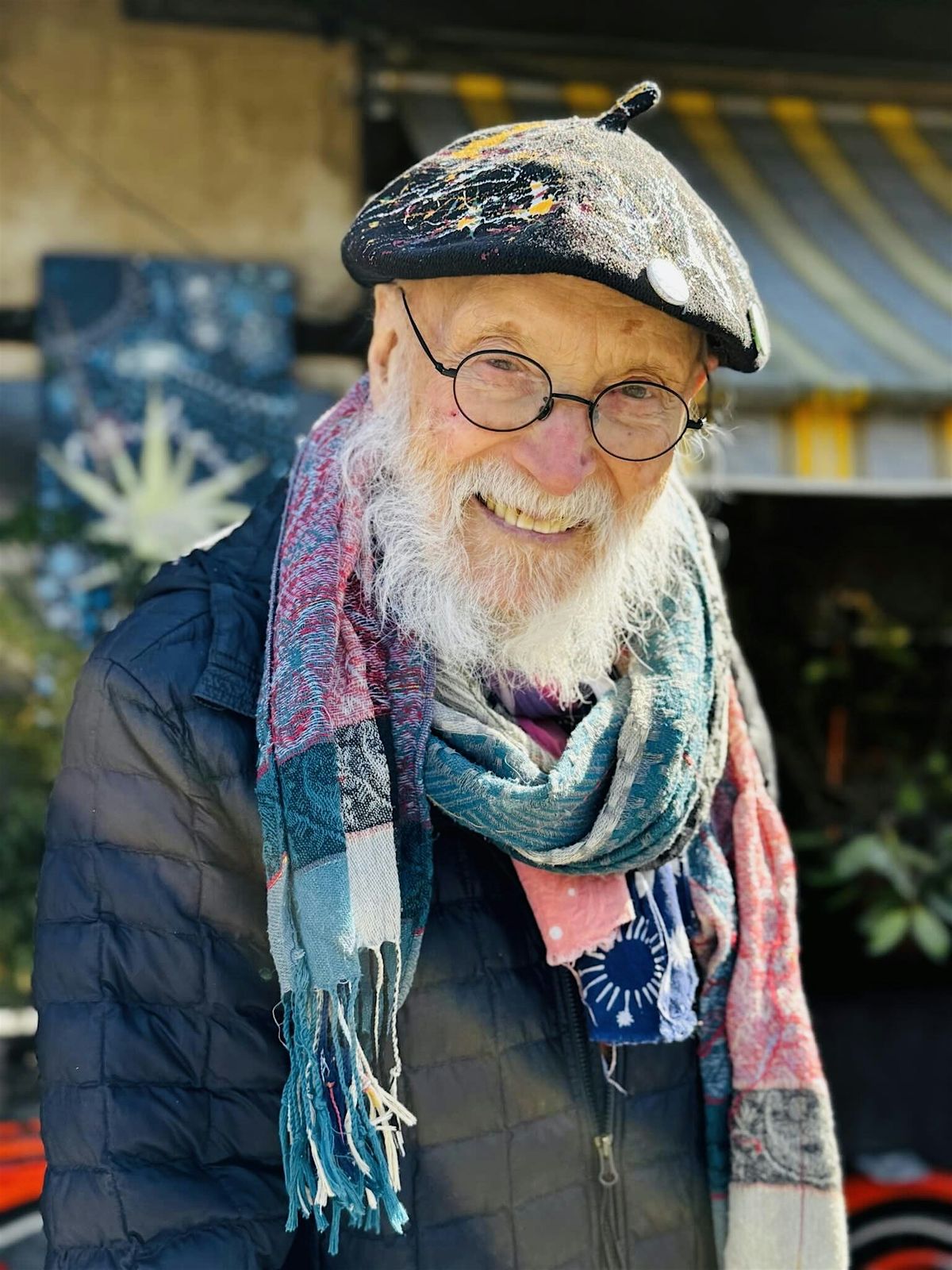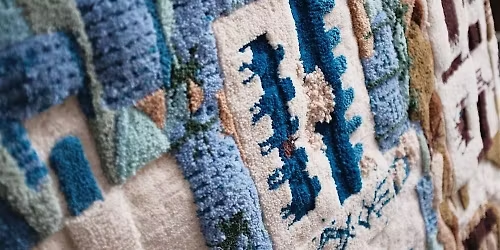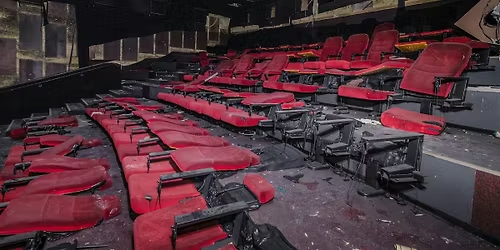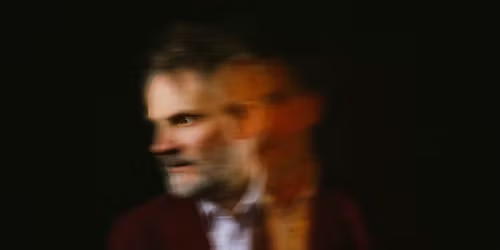Selections from Terry Riley's "The Holy Liftoff" (2022-25)
Schedule
Wed Oct 22 2025 at 07:00 pm to 09:00 pm
UTC-04:00Location
Holden Chapel | Cambridge, MA

About this Event
"The Holy Liftoff" (2022-25) by Terry Riley
Curated and hosted by Professor Claire Chase
The iconic American composer Terry Riley (b. 1935) began The Holy Liftoff (2022-2025)* as an open-score sketchbook of brilliantly colored drawings for multiple flutes, commissioned by Claire Chase for her multi-year Density 2036 project. Through a realization by Samuel Clay Birmaher, these sketches have since evolved into a multidimensional work blending through-composed material, graphic notation, evocative artwork, and Riley’s signature open-form scoring. Heard now as an eight-voice chorus of flutes (seven pre-recorded and one live, played by Chase), The Holy Liftoffis joined on the program by Riley’s Pulsing Lifters (2022) and Pulsefield 3 (2025), both expanding the modular, improvisatory spirit of the larger project: Pulsing Lifters reimagined for keyboards by Alex Peh, and Pulsefield 3 with its vivid drawings culminating in a return to song—“the oldest and most urgent mode of music-making,” as Chase notes. For this performance, she is joined by Parker Quartet, pianist Alex Peh, saxophonist Neil Leonard, and special guests from the Berklee Interdisciplinary Arts Institute, the Harvard New Music Ensemble, and Students in Contemporary Chamber Music.
Featuring:
- Parker Quartet
- Alex Peh, piano
- Neil Leonard, saxophone
- Special Guests from Berklee Interdisciplinary Arts Institute
- The Harvard New Music Ensemble (MUSIC 180)
- Students in Contemporary Chamber Music (MUSIC 186)
Program:
“Pulsing Lifters” (2022)
“Pulsefield 3” (2025) For large ensemble
Alex Peh, piano
Neil Leonard, saxophone
Special Guests from Berklee Interdisciplinary Arts Institute
The Harvard New Music Ensemble (MUSIC 180)
Students in Contemporary Chamber Music (MUSIC 186)
INTERMISSION
Selections from “The Holy Liftoff” (2022-2024) For flute and string quartet
Realization by Samuel Clay Birmaher
Claire Chase, flutes
Parker Quartet
*”The Holy Liftoff” is the twelfth cycle of Claire Chase’s Density 2036 project.
Terry Riley:
Terry Riley (b. 1935) is often credited with the dual title of being the father of both the Minimalist movement and psychedelic rock. His career has had a profound influence on a range of musicians and composers, including Steve Reich, Philip Glass and John Adams, as well groups such as The Who, The Soft Machine and Tangerine Dream. Riley’s pieces showcase both his experiments in process music and his deep study of Indian classical forms, resulting in a trailblazing career that has spanned over half a century.
Riley, born in Colfax, California, was impressed by music from an early age, taking up the violin for a short time and entertaining ambitions to become a concert pianist. While in high school, an influential teacher introduced him to 20th century composers, including Bartok and Stravinsky. He went on to study composition at San Francisco State College and in 1958, started graduate studies at UC Berkeley. It was at Berkeley that he began his lifelong association with La Monte Williams, another force in the development of Minimalism.
In 1964, after a sojourn in Paris, where he worked as a lounge pianist and experimented with electronic tape, Riley moved to New York. There, he encountered Young’s infamous improvisational marathon, the Theatre of Eternal Music. Soon after, Riley began work on a piece built on 53 musical modules, each containing a musical fragment, with players moving through the modules at their own pace. In C premiered in 1964 – with Steve Reich playing electric piano. Alex Ross cites Alfred Frankenstein’s review in the San Francisco Chronicle as best encapsulating the spirit of the work: “At times you feel you have never done anything all your life long but listen to this music and as if that is all there is or ever will be.”
Riley’s work with electronic tape led to further milestone works, including A Rainbow in Curved Air, Poppy Nogood and the Phantom Band, The Persian Surgery Dervishes, and Shri Camel. In 1970, Riley made the first of what would be many trips to India to study with Pandit Pran Nath. Over the next 26 years, he performed with the renowned singer as a tambura, table and vocal accompanist. He taught North Indian Raga and music composition at Mills College throughout the 1970s. It was at Mills that Riley met David Harrington, founder of the Kronos Quartet. Their long partnership gave rise to several works for the group, including The Cusp of Magic (2003) for string quartet and pipa, The Sands, Salome Dances for Peace (1985-6) , the recording of which was nominated for a Grammy in 1989.
Riley is now based in Japan and continues to perform today, and he remains an active composer and teacher.
Parker Quartet:
Internationally recognized for their “fearless, yet probingly beautiful” performances (The Strad), the Grammy Award-winning Parker Quartet has established itself as one of the preeminent ensembles of its generation since its founding in 2002. Renowned for their fresh interpretations of canonical works and their passionate advocacy for contemporary music, the Quartet continues to chart a dynamic artistic path rooted in both tradition and innovation.
Praised by Gramophone for playing in which “virtuosity and emotion are one,” the Parker Quartet has performed for over two decades on many of the world’s leading stages. Recent seasons have included appearances at Carnegie Hall, Wigmore Hall, Konzerthaus Berlin, Philadelphia Chamber Music Society, the University of Chicago, the 92nd Street Y, and Da Camera of Houston, among others. The Quartet has also been featured at major festivals such as Tanglewood, Big Ears, Norfolk, Lake Champlain, Bridgehampton, Skaneateles, San Miguel de Allende, and the Banff Centre.
In the 2025–26 season, the Quartet launches The Schubert Project—a deep exploration of Franz Schubert’s final chamber works, including his late string quartets and the Cello Quintet. This project aims to contextualize Schubert’s late style through multidisciplinary lenses and performance collaborations. Upcoming quintet engagements include performances with Jay Campbell at the Crypt Sessions in New York City, with Paul Watkins at Harvard and Yale Universities, and with Raman Ramakrishnan at DACAMERA of Houston. Other season highlights include a multi-island concert tour of Hawaii and renewed collaborations with mezzo-soprano Fleur Barron.
Alex Peh:
Pianist Alex Peh, described by the Wall Street Journal as “stunning” and possessing “facility, flair and fearlessness”, collaborates with musicians globally in search of shared resonances that emerge from friendship and connection. A 2021 Fulbright Global Scholar, and a 2019 Asian Cultural Council Fellow, Dr. Peh made his Carnegie Hall debut in January 2023 alongside improvisers Claire Chase, Tyshawn Sorey, Susie Ibarra, Senem Pirler, Matana Roberts and Lisa Harris, performing a one-hour version of Pauline Oliveros’ The Witness.
Peh is part of an improvising piano trio, Talking Gong, with percussionist and composer, Susie Ibarra; and flutist, Claire Chase. Their newest piece created by Ibarra, Sky Islands, received the 2025 Pulitzer Prize in music. They performed the North American premiere of Sky Islands at the Asia Society in New York City, July 18, 2024, with the Bergamot String Quartet and percussionist, Levy Lorenzo. The debut recording will be released on Habitat Sounds, Spring 2026.
Peh travelled to Yangon, Myanmar to study Burmese Sandaya piano, from master pianist Dr. U Yee Nwe. Peh began his studies in Sandaya from Kyaw Kyaw Naing, an internationally-acclaimed percussionist, and leader of the national Saing Waing orchestra, the classical percussion and gong orchestra of Myanmar. Peh collaborated with Kyaw Kyaw Naing to create a Burmese Saing Waing ensemble, comprising students, faculty and community members at SUNY New Paltz. In 2019, they performed at Roulette Intermedium, New York City, performing a new composition that Kyaw Kyaw Naing composed for the group entitled Growing Rhythm.
In 2021 Peh received a Fulbright Global Scholar fellowship that allowed him to connect with Greek pianist and musicologist Nikos Ordoulidis in Naoussa, Greece; Burmese pianist Ne Myo Aung in Bangkok, Thailand and Pooyan Azadeh in Bayreuth, Germany. Together they created a new album of piano music, Attune, released on Habitat Sounds, and a companion ethnographic film Intermittent Attunement in collaboration with Dr. Lauren Meeker, Alyson Hummer and Madelyn Colonna. Excerpts of the film and album were premiered at National Sawdust, Brooklyn NYC. Intermittent Attunement was selected for screening at the Ethnografilm festival in Paris, France at the Club D’Etoile.
Peh received his musical training from Indiana and Northwestern Universities where he worked with Arnaldo Cohen, Menahem Pressler, Sylvia Wang and Evelyne Brancart. He attended the Banff, Aspen and Tanglewood music festivals where he worked with Emanuel Ax, Pamela Frank, Claude Frank, Ignat Solzhenitsyn, Charles Dutoit, and Peter Serkin. He is an associate professor of piano at SUNY New Paltz, and associate chair of the music department.
Neil Leonard:
Neil Leonard is a composer, saxophonist, and transdisciplinary artist. The healing power of collaboration, collective listening, and cross-cultural dialogue is central to his work. He maintains active collaborations in Brazil, Burundi, Canada, Cuba, China, Italy, Japan, Korea, Tanzania, the UK, and across the US.
Recent presentations include performances at Donaueschinger Musiktage (2024) and the Venice Biennale (2024). His installation Matanzas Sound Map is currently exhibited in the East Tank at the Tate Modern was selected as one of 25 highlights from the collection commemorating the museum’s 25th anniversary (2025). His composition Notes After Lockdown (2024) for string orchestra and video, was commissioned by the Morningside Music Bridge Orchestra.
His compositions were featured by Carnegie Hall, documenta 14 (Germany), Musicacustica (China), the International Computer Music Convention (Canada), the Tel Aviv Biennial for New Music (Israel), Moscow Autumn (Russia), Museo Reina Sofia (Spain), the Jazz Plaza International Festival (Cuba), and in NYC at Roulette, Experimental Intermedia Foundation, Issue Project Room, and Knitting Factory.
Leonard's sound installations have been featured by Mass MoCA, Williams College Museum of Art, Peabody Essex Museum, Media Lab at MIT, Havana Bienal (Cuba), Bienal de Bahia (Brazil). Large-scale installations and performances with Magdalena Campos, Fujiko Nakaya, Phill Niblock, and Tony Oursler were featured by MoMA, Tate Modern, documenta, Venice Biennale, Whitney Biennale. Leonard's ensemble featured Joanne Brackeen, Terence Blanchard, and Robin Eubanks. Leonard performed and recorded with Juan Blanco, Alvin Curran, Richard Devine, Vijay Iyer, Phill Niblock, Rudresh Mahanthappa, Los Muñequitos de Matanzas, Robin Rimbaud (Scanner), Stephen Vitiello, Hal Wilner, and Amnon Wolman.
Leonard was a Sacatar Institute Fellow (2023), Robert Rauschenberg Foundation Artist-in-Residence (2016); Fulbright Specialist Award recipient (2016); M.I.T. Art, Culture, and Technology Research Affiliate. He is a Professor at the Berklee College of Music and the founding Artistic Director of the Berklee Interdisciplinary Arts Institute.
Claire Chase:
Claire Chase, described by The New York Times recently as “the North Star of her instrument’s ever-expanding universe,” is a musician, interdisciplinary artist, curator, and teacher. Passionately dedicated to the creation of new ecosystems for the music of our time, Chase has given the world premieres of hundreds of new works by a new generation of artists. She was the first flutist to be awarded a MacArthur Fellowship in 2012, and in 2017 was the first flutist to be awarded the Avery Fisher Prize for Classical Music from Lincoln Center for the Performing Arts. Chase served as the Richard and Barbara Debs Creative Chair at Carnegie Hall in the 2022-23 season and as the Music Director for the 2025 Ojai Music Festival.
Chase has performed as a soloist recently with the New York Philharmonic, Los Angeles Philharmonic, San Francisco Symphony, Helsinki Philharmonic, BBC Scottish Symphony, Munich Chamber Orchestra, Kyoto Symphony, and London Philharmonia. Recent concerto projects include Kaija Saariaho's "Aile du Songe" at Carnegie Hall and The Kennedy Center, and the world premiere of a new duo concerto by Dai Fujikura which Chase performed with the Netherlands Radio Philharmonic at Royal Concertgebouw in Amsterdam in January with the violinist Akiko Suwanai and on tour in Europe with the violinist Leila Josefowicz. In the 2022-23 season, Chase premiered a new duo concerto by Felipe Lara with the vocalist and bassist esperanza spalding and the conductor Susanna Mälkki, which was named one of the Best Classical Music Performances of the Year by The New York Times.
In 2013, Chase launched the 24-year commissioning project Density 2036, described by The New Yorker as “a quarter-century journey with little precedent.” Now in its 12th year, Density reimagines the solo flute literature through commissions, performances, recordings, educational initiatives, and a community-focused approach to cultural production. In 2023, Chase performed all ten Density programs to date in a weeklong series of events co-produced by Carnegie Hall and The Kitchen. Central to the Density project is a commitment to supporting an international, multigenerational community of flutists who will take the Density repertoire in bold new interpretive directions. The Density Fellows program, launched in 2023 in celebration of the 10th anniversary, provides an international cohort of emerging flutists with the resources to make the Density repertoire their own. Chase is the artistic director of Density Arts, a nonprofit organization dedicated to the advancement of the flute in the 21st century.
As an undergraduate at Oberlin Conservatory, Chase co-founded the International Contemporary Ensemble, a collective of musicians, digital media artists, producers, and educators committed to creating collaborations built on equity and cultural responsiveness. She served as the ensemble’s artistic director until 2017 and as an ensemble member on performance and educational projects on five continents, developing an artist-driven organizational model that resulted in the premieres of over 1,000 new works and earned the group multiple Chamber Music America/ASCAP Awards for Adventurous Programming, the Trailblazer Award from the American Music Center, and the Ensemble of the Year Award from Musical America Worldwide.
A deeply committed educator, Chase is Professor of the Practice in the Department of Music at Harvard University, where she teaches courses on contemporary music, interdisciplinary collaboration, and cultural advocacy. Chase is also Creative Associate at The Juilliard School, where she mentors young artists and engages students in a range of interdisciplinary projects. Chase’s Debs Creative Chair residency at Carnegie Hall encompassed programming for all ages, including a “Day of Listening” for children and families inspired by the listening philosophies of Pauline Oliveros. Chase partnered with MacArthur Fellow Josh Kun to expand her Pauline Oliveros project as part of Getty’s PST ART x Science Collide festival in 2024-25.
Claire Chase’s extensive discography includes eleven solo albums of world premiere recordings and dozens of collaborative recordings with ensembles, composers, and sound artists from a wide range of musical genres. Chase grew up in Leucadia, California, with the childhood dream of becoming a professional baseball player before she discovered the flute.
Berklee Interdisciplinary Arts Institute:
The Berklee Interdisciplinary Arts Institute (BIAI) is led by Neil Leonard, a professor in the Electronic Production and Design Department and a transdisciplinary artist whose career has included saxophone performance, composition, and multimedia art installation. The institute was founded on Leonard’s vision that active collaboration across the arts (music, film, dance, theater, visual art, and emerging technologies) is a foundation for innovation and creativity, and provides a broader set of opportunities for musicians.
To this end, the BIAI provides training in interdisciplinary arts and a platform for Berklee students to collaborate with artists from around the world and across all artistic practices to explore our shared humanity.
Graduates of the institute have gone on to become multimedia artists and music technology developers, and have worked with visual production companies and on multimedia festivals. One BIAI graduate established a Grammy-winning Broadway-based music production company.
Where is it happening?
Holden Chapel, Harvard Street, Cambridge, United StatesEvent Location & Nearby Stays:
USD 0.00














![@t[TBD]Open Mic!](https://cdn.happeningnext.com/events7/banners/2bd0acbdb83a9a639e409ffa1beb2f50b6db132e6350b7f3cd0623da0d7089ad-rimg-w748-h453-dcffffff-gmir.jpg?v=1759269679)




